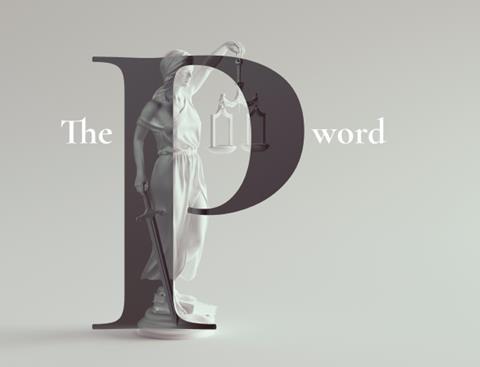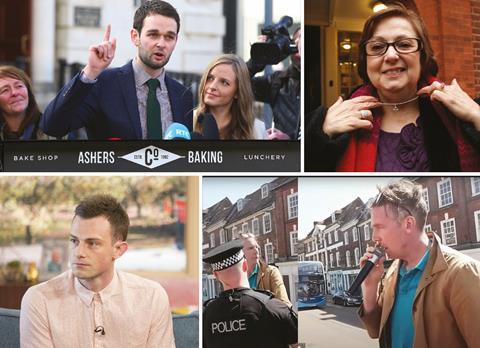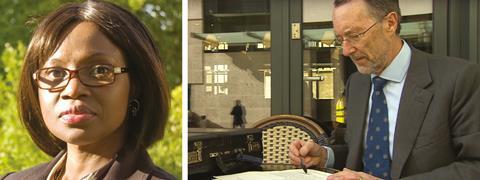In recent years there have been a string of high-profile religious freedom cases in the news. But is it really true that Christians in the UK are experiencing persecution? Tim Wyatt speaks to those on both sides of the debate
For Dominic Muir, 22 April 2020 began just like many other days. The father-of-two felt a “leading of the Spirit” to preach and so, as he had done hundreds of times before, he drove his truck to the town centre of Blandford Forum, not far from his home in Somerset.
As shoppers ambled by, the affable 44-year-old sang ‘Amazing Grace’ and began preaching from John 3:16. But as he shared his testimony, a police officer approached and told him to “move on”. Although the evangelist insisted he was entitled to be there, he agreed to wrap up his message. But a few minutes later, the officer returned, climbing onto the back of the truck and grabbing Muir by the arm, forcing him to stop. “It was painful, intimidating, humiliating,” he says.
On returning home, he rang Christian Concern. A letter to the chief constable of Dorset Police threatening to sue the force quickly produced a settlement: £50 to Muir and £1,200 to the Christian Legal Centre for costs. Dorset Police said their officer had believed the preaching broke Covid lockdown rules and made no admission of wrongdoing, despite settling the claim.
Reflecting on the experience, Muir says he is not surprised by the opposition: “You can’t avoid it. Any group of Christians who are doing the will of God will suffer persecution.”
Andrea Williams, the head of Christian Concern, agrees. She says the common thread in the cases that her team work on is that the victims are ordinary Christians, prepared to “stand up” for Jesus. “And that’s why they are persecuted,” she says.
IT SEEMS INEVITABLE THAT THE MINORITY WHO HOLD TO ORTHODOX TEACHING WILL FIND PUBLIC LIFE LESS HOSPITABLE
In recent years, there have been a steady stream of cases involving Christians claiming persecution. Many have made national headlines: nurses disciplined for praying with patients, council workers sacked for refusing to marry gay couples, employees forced to cover up their cross necklaces.
But some argue that describing the situation in the UK as persecution cheapens the term and is wildly over the top. Still more go further and question the tactics – and even the motives – of those groups, including Christian Concern, who promote claims of persecution.

Simon Calvert, deputy director for public affairs at the Christian Institute, claims that it is wrong to speak of persecution in Britain: “We have to be very careful about using the word ‘persecution’ here in the United Kingdom. We enjoy freedoms and religious liberties of a kind which most Christians in most of the world, for most of human history, could only have dreamt of,” he says. The Christian Institute have taken on legal cases to defend Christians, including the famous Ashers Bakery “gay cake” row in Northern Ireland, but Calvert says this does not amount to persecution. “When we say persecution, we think of people losing their lives, their liberty or their livelihood for the sake of their faith, and it being state-sanctioned. Thankfully, that is not happening in the United Kingdom.”
The American academic of evangelicalism Andrea Hatcher agrees, explaining that the word ‘persecution’ means much more than mockery – or even discrimination – but entails “dire physical threats… leading to the ultimate point of martyrdom”. It is a view shared by Peter Ould, an Anglican priest and commentator. He says persecution conjures up images of martyrdom and brutal repression in the early Church, things which clearly do not happen in Britain today.
A SLIDING SCALE
Persecution, even in the early Church, has taken many forms. As historian Diarmaid MacCulloch has written, even during the worst bouts of repression by the Roman Empire only a small number of Christians were actually martyred. The majority were not thrown to the lions or crucified, but instead faced bureaucratic demands that they sacrifice to Roman gods, or suffered hostility from their neighbours because of their faith.
Nobody, including Williams, would claim the UK Church is suffering like believers in the early Church, or those in North Korea or Iran today. But is it reasonable to argue that as long as people like Muir are not being thrown to the lions, there is no persecution taking place?
When the state pressures you to act in a way that goes against your faith, that may feel like persecution, even if it does not result in death or imprisonment. When your peers are so hostile to Christianity that they harass you in the street or ostracise your business, most would agree that this, too, is persecution, even if it is not done at the point of a sword.
Muir himself believes we should conceive of a “sliding scale”, with authoritarian regimes executing pastors at one end, but beginning with “being cursed at, hated, rejected, sacked” at the other.
Williams agrees. What begins with name-calling, misrepresentation and being maligned could grow and spread; denying it the title of persecution does nobody any favours, she says.

PROTECTED BELIEFS
If persecution can be less than physical violence or imprisonment, the question remains: is it the best framework to understand what is happening in Britain today?
A key point remains that Britons can believe whatever they want. Ould notes that when you read the judgements from legal cases fought by Christian Concern and others, judges are very clear: the individual’s beliefs – whether opposition to gay marriage or a commitment to telling others that Jesus is the only way to God – are entirely legal and protected. It is a point emphasised in the Evangelical Alliance’s booklet Speak Up!, published in association with the Lawyers’ Christian Fellowship, and designed to “inspire Christians with confidence and knowledge of the current legal freedoms we have to share our faith”.
Cases of Christians losing their jobs over biblically conservative views, or after sharing their faith in the workplace are rare – and have tended to be quickly overturned by the courts. But there are other, more complex cases, in which the believer may claim to have been targeted for their beliefs, which often result in employment tribunals ruling they were fairly disciplined or suspended for their actions, not their thoughts.
It is this kind of conflict which generates the bulk of the persecution narrative, Hatcher believes: “You are still free to hold traditional orthodox Christian views, but that does not change the public policy that a democratic society have chosen to enact,” she explains. “Is that persecution or is it the inevitable result of a pluralistic society where there are competing values which have to coexist in the public square?”
Famous cases, such as Lillian Ladele, a registrar for the London Borough of Islington who was disciplined for refusing to officiate at civil partnerships when they were legalised in 2005, would fall into this category. She took the council to court, claiming discrimination on the grounds of her religious beliefs, but a topsy-turvy legal battle ended with both the Court of Appeal and the European Court of Human Rights concluding Islington had acted fairly.
As the UK moves further away from Christian beliefs, it seems inevitable that the minority who continue to hold to orthodox teaching will find public life less hospitable. In a society which has democratically decided to offer marriage to same-sex couples, a Christian may find it impossible to act as a registrar. But is this persecution, or just the result of two competing worldviews?
Our pro-gay marriage society does not insist Christians abandon their personal beliefs. Therefore, can it be fairly accused of persecution if it expects everyone, regardless of faith, to uphold the law of the land? If this means some jobs are unsuitable for Christians, is this just the price to be paid for living as exiles and strangers in a world still waiting for its redemption by Christ?

INTOLERANCE
In another recent case promoted by Christian Concern, magistrate Richard Page was sacked after objecting to an adoption application from a same-sex couple. He contested this, claiming he had been fired for voicing his Christian beliefs. A judge ruled Page was “incapable of honouring his undertaking” to act as a magistrate in a way that was free from bias: “A child’s future is to be decided on the evidence before the court and in accordance with the law…It is not open to individual judges to superimpose their own beliefs, however sincerely held.”
Ould argues that Page was free to believe children fared better when adopted by heterosexual couples, but he could not make decisions based on that conviction when the law of the land clearly contradicted it. If he was unable to separate his beliefs from his job to implement the law, then serving as a magistrate was no longer open to him. Therefore, he says, this was not a case of persecution but simply the state insisting its officers execute the law without bias.
Williams sees it differently, describing cases such as Page’s as an example of the establishment’s growing intolerance towards orthodox Christian beliefs. If a nation requires its citizens to “self-censor” while in public office, it sends a “chilling” message to all Christians, she warns.
WE ENJOY FREEDOMS WHICH MOST CHRISTIANS IN THE WORLD FOR MOST OF HISTORY COULD ONLY HAVE DREAMT OF
Calvert also holds little truck with Ould’s framing, adding that even post-Christian states should uphold the rights of those with minority views. In wartime, and under the Abortion Act, Christians are provided with protections which enable them to conscientiously object without suffering professional or legal consequences, he note. “The response of a genuinely tolerant and diverse society is to say: ‘That’s not my view but I respect your right to hold that view and we will make some kind of accommodation for you.’” Christians should not be excluded from public life because the majority opinion now conflicts with traditionally held biblical views.
Williams concedes that Christian Concern have, at times, struggled to make clear the complexity of some cases. “Courts and lawyers are downstream of culture,” she says. As such, judgements do not always reflect the “lived reality” of the people involved. “Can I tell the story so that the world can understand it very easily? No. Will I continue to stand with them? Yes.”
There are many cases, like Page’s, where it is difficult to fully understand what happened and whether or not it amounted to persecution. A court judgement reads one way, a Christian Concern press release reads another, social media reports something different again. There are countless, often subtle, ways in which our Christian views collide with those of our employers, councils and the law. It is often not possible to conclude definitively what constitutes unfair discrimination and what is persecution.
US AND THEM
For critics of the persecution narrative, bodies such as Christian Concern ignore this grey reality in favour of black and white accounts: noble believers oppressed by aggressively secular authorities. Hatcher traces this back to the growth of the Religious Right in 1980s America, when evangelicals were mobilised against the Democrats, fearing erosion of their religious liberties. Even after the Republicans took office, campaigns around the supposed persecution of Christians continued, ensuring the movement (and fundraising machine) did not dissipate. “It benefited them to use the word ‘persecution’…because that does whip up this fear and gets them attention, clicks and dollars, and sustains the life of their organisation,” she argues.
Citing psychologists’ studies of cults, Ould says believing one’s own group is persecuted helps foster identity, creating a powerful narrative of ‘us and them’. This creates a constant need for more stories of attack by the outside world to maintain the boundaries between the virtuous ‘us’ and the nefarious ‘them’.
Others have noted that groups campaigning on persecution are in a win-win situation. If they win, they have proof that Christians are discriminated against; if they lose, it underlines how the system is stacked against them. Whatever the result, the story is the same: they are standing up for Jesus and they need more donations to fund this vital work. “If I was cynical, it’s just a massive cash cow,” Ould remarks. Hatcher tellingly refers to the nexus of legal groups, lobbyists and fundraisers working in the religious liberty arena as the “persecution industry”. But Williams rejects this analysis, saying the majority of the 1,000 plus inquiries that Christian Concern fields each year are handled quietly, without any publicity. She says they won more of those cases than they lost, although conceded that sometimes they did not shout loudly enough about their wins in case it was “counterproductive” to the individual concerned.

RIGHT TO FIGHT?
There are also theological concerns about the persecution narrative. Are we called to aggressively assert our rights, entering into legal battle with anyone who opposes us? Does believing that the world is out to get us conflict with our mission to love our enemies? The persecution narrative can feed into an “immature psychology” suggests Ould, which is in opposition to the “open, gracious vulnerability” we see modelled by Jesus as he passively accepts his arrest and crucifixion.
Williams argues otherwise, insisting she was tired of constant battles over issues such as homosexuality, and that her organisation was actively focused on spreading the good news. “The gospel is a beautiful, radical, hopeful message of love, not of fear. And that’s what we’re all about.”
WE ENJOY FREEDOMS WHICH MOST CHRISTIANS IN THE WORLD FOR MOST OF HISTORY COULD ONLY HAVE DREAMT OF
Calvert also rejects the idea that Christians should passively avoid defending themselves or calling attention to unfair treatment. While Britain still has excellent laws protecting freedom of religious expression, overreach by authorities and employers is becoming increasingly more common, he says: “The fact that this happens in the first place creates a chilling effect on freedom of speech; it makes people afraid that the same thing could happen to them. That’s why it’s important that, as Christians, we stand up for those people.” He adds that the Christian Institute takes its example from Paul, who, in Acts, fought unjust imprisonment on the grounds of his rights as a Roman citizen: “There is a time and a place for Christians to assert their legal rights, because as the saying goes, if you don’t use them, you’ll lose them.”
The question of whether Christians are being persecuted in Britain today is, ultimately, a complicated one. Undoubtedly, there are increasing numbers of people who believe that they are being maligned, disciplined or unfairly victimised because of their faith. But there continues to be mixed views on whether these incidents amount to justification of use of the P-word. One person’s discrimination is another’s reasonable request in a secular society.
And even if we could agree on how to best characterise the stories of Muir, Page or Ladele, there remains debate about the best way to respond. For every Williams, insisting legal defiance is a question of obedience to Jesus, there is an Ould, preaching gracious vulnerability. Only one thing does seem sure: as Britain continues its steady drift into post-Christendom, the flashpoints between Christians and wider society will become more common. And so will the arguments over what to do about them.






































